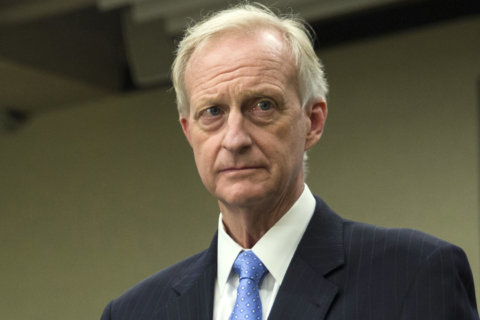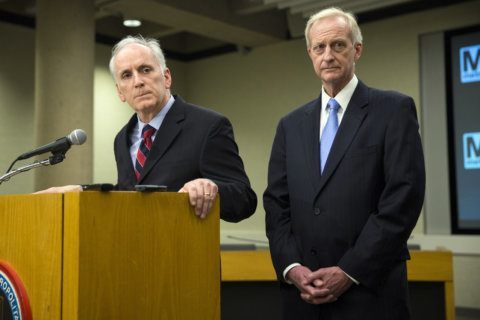A newly revealed document backs the conclusion that the Metro Board’s Ethics Committee determined Board Chairman Jack Evans violated ethics rules when he tried to help a parking company without disclosing a $50,000 payment.
A memo written in May by Metro’s general counsel indicated the deal to quietly close the investigation on May 7 — a deal that multiple sources had confirmed to WTOP, but Jack Evans continued to deny earlier this week.
The memo is labeled “attorney-client privileged,” “attorney work product,” “deliberative process privileged” and “self-evaluative privileged.” It was obtained by WTOP and confirmed by Metro Board member Clarence Crawford, who chaired the Ethics Committee for the investigation into allegations that Evans used his public position for personal gain.
“The Ethics Committee found that Mr. Evans violated Code of Ethics Article II.D by failing to disclose a conflict of interest,” the memo said.
Following the finding, the memo also stated that the matter had been resolved.
“Mr. Evans has agreed to amend his annual disclosure forms from 2016 to the present to list the consulting client relevant to the conflict of interest. Mr. Evans has also agreed that he will not seek reelection as Chair of the WMATA Board,” the memo said.
Evans has said he was already planning to allow someone else to take over, and his lawyer disputed whether any formal action was taken by the Metro Board.
The Ethics Committee has the authority under board policies to resolve issues itself and has not typically disclosed details in the past.
Crawford wants more transparency in the future, and just authorized the disclosure of a 20-page summary of an outside law firm’s investigation into Metro Board members and the people who appoint them in Maryland, D.C., Virginia and the federal government.
Any of those people can make the information public, Crawford said, although several were initially reluctant to do so immediately Wednesday night.
“You’ll be able to read it for yourself, and then you can come to your own conclusions,” Crawford said.
Crawford wrote a letter on Monday to Maryland Gov. Larry Hogan and Virginia Gov. Ralph Northam based on that summary, which outlined a series of violations of Metro’s founding compact and the board’s own ethics rules.
“I extracted the opinions, the findings with respect to the opinions, I took those verbatim and put those into my letter,” Crawford said.
He had begun working on it following a request from the Northern Virginia Transportation Commission, but accelerated the work after hearing Hogan and Northam would be making a similar request Monday.
“There’s no reason why we can’t have agreement on what happened,” Crawford said, citing the memo and the verbal agreements with Evans on May 7.
Metro’s investigation, which mainly consisted of six weeks of investigation by the outside law firm, only focused on Evans’ role at Metro and not other accusations tied to Evans’ D.C. Council job. He remains under federal investigation.
Crawford said that he was not aware of anyone in law enforcement asking for the findings of the Metro investigation, and said he was not pressured by the Hogan administration to release the details this week or take any particular action.
“I had absolutely no pressure whatsoever,” Crawford said.
Hogan has been an outspoken critic of Evans and has called for his resignation.
Crawford hoped to suggest changes to the Metro Board’s ethics policies ahead of his final board meeting next week. He expects to be replaced by Maryland Transportation Secretary Pete Rahn under Maryland’s Metro funding bill passed last year.
District Department of Transportation Director Jeff Marootian is an alternate on the Metro Board. Virginia’s state appointee Paul Smedberg is expected to become Board Chairman next week.
Changes to ethics policies?
Crawford said he consulted lawyer Kevyn Orr throughout the investigation, since Orr helped write the board’s policies.
“In this environment, with a lot of scrutiny, I think there are some opportunities to improve it,” Crawford said.
The changes would include requiring a written, public report on any board member ethics investigations, a fifth person on the Ethics Committee to avoid 2-2 tied votes, a required inspector general review of the complaints for corruption (the committee can refer such complaints to the inspector general now), and a clear statement of how supporting documents, such as the 20-page summary of investigative findings, should be handled.
Crawford paused when asked if he would be comfortable serving on the Metro Board with Evans in the future were his term not up.
“It’s not the board’s call, it is the appointing authority. Our job then is to, with the people that the appointing authorities give us, create an effective functioning board that takes care of the issues of WMATA,” Crawford said.
Below is the memo.
Metro Board Ethics Committee May 7 memo by wtopweb on Scribd






